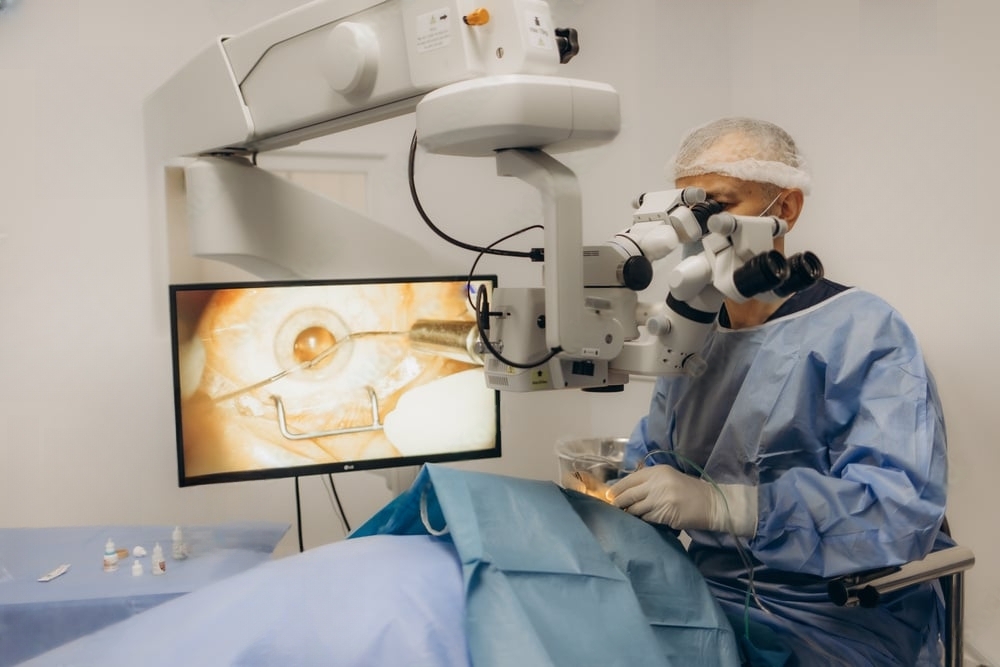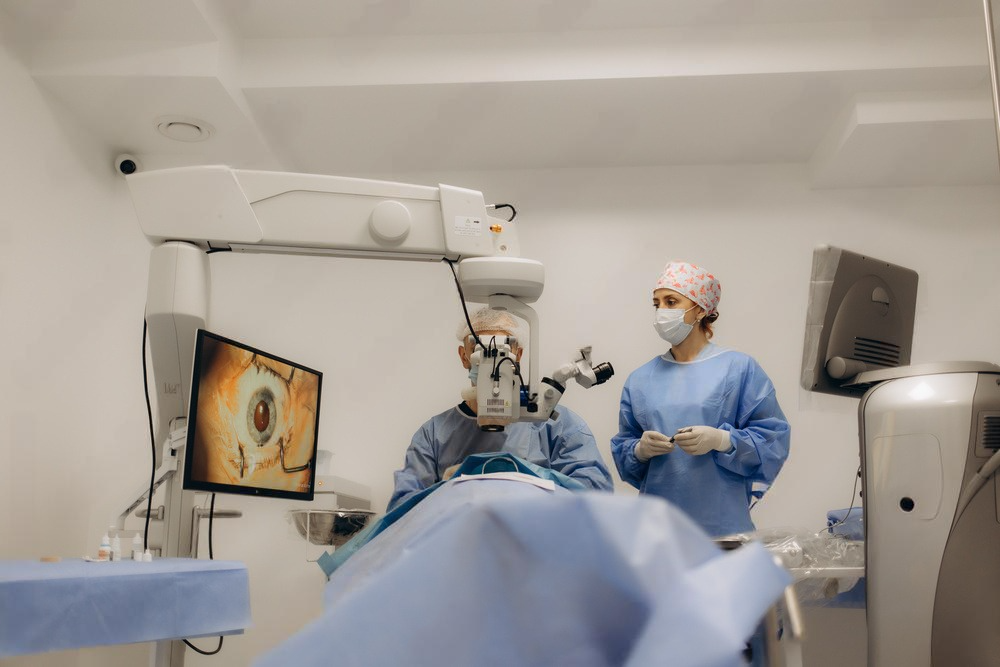Phacoemulsification vs. Laser Cataract Surgery: Key Differences You Need to Know
One of the most common questions is about the difference between phaco and laser cataract surgery. Each option works well, yet they come with their own unique characteristics.
Phacoemulsification, or phaco, is the traditional method. The process employs ultrasonic waves to fragment the clouded lens.
On the other hand, laser-assisted cataract surgery uses a high-precision laser. This technology offers a level of accuracy that manual methods can’t match. This piece will explore the details of each method in depth. We’ll compare their benefits, risks, and outcomes to help you make an informed decision.
Understanding Cataracts and Cataract Surgery
Cataracts, a widespread eye disorder, typically impact elderly individuals. They cause the eye’s natural lens to become cloudy, impairing vision. This clouding leads to difficulties with activities like reading and driving, affecting quality of life. Cataract surgery aims to restore clear vision by removing the cloudy lens. The procedure involves replacing it with a clear artificial lens, known as an intraocular lens (IOL). Modern cataract surgery, including phacoemulsification and laser-assisted techniques, offers highly effective solutions. Patients usually experience improved vision and a better daily life post-surgery.
Traditional Cataract Surgery: Phacoemulsification
Phacoemulsification, often called phaco, is the most common form of traditional cataract surgery. It has been a staple procedure for decades. This method relies on ultrasound technology to break up and remove the cloudy lens. In phaco surgery, the surgeon makes a tiny incision in the eye. A probe is then inserted to emulsify the lens, which is simultaneously suctioned out.
Following the extraction of the clouded lens, an artificial intraocular lens (IOL) is inserted. This artificial lens helps restore vision. The incision usually heals by itself without stitches.
The Phaco Procedure Explained
The phaco procedure starts with anesthesia to numb the eye, ensuring patient comfort. The surgeon creates a small incision with a specialized tool. This is a key step in gaining access to the cloudy lens. Next, an ultrasonic probe is used to emulsify the cloudy lens. The emulsification process transforms the lens into a liquid that can be easily removed. Once the emulsification is complete, the surgeon inserts the artificial intraocular lens (IOL). The lens corrects vision, improving clarity and focus for daily tasks. Typically, the incision heals quickly, and stitches are not necessary.
Benefits and Limitations of Phaco
Phacoemulsification offers various advantages. It is a quick, tried-and-tested procedure. Recovery times are generally short, allowing patients to resume daily activities quickly. While phaco is effective, it isn’t without its limitations. It relies heavily on the surgeon’s skill for success. Potential risks include infection and inflammation, though these are rare. Here are some key benefits and limitations of phaco:
- Benefits: Short procedure duration, fast recovery, proven track record.
- Limitations: Manual technique dependency, possible complications, limited astigmatism correction.
Laser-Assisted Cataract Surgery: The Basics
Laser-assisted cataract surgery (LACS) represents a significant advancement in ophthalmology. It uses femtosecond laser technology to enhance precision during surgery. This cutting-edge approach refines several steps of traditional cataract surgery. The laser makes accurate cuts in the corneal tissue.
These incisions allow for better access and removal of the cloudy lens. The laser also fragments the lens, reducing the ultrasonic energy needed. Laser technology minimizes manual steps, providing increased customization and safety. Tailored incisions can address issues like astigmatism during surgery. Such precision can lead to improved outcomes and reduced healing time.
How Laser Surgery Works
Laser cataract surgery begins with detailed eye mapping using advanced imaging systems. This real-time imaging guides the laser to make precise corneal incisions. This precision aids in accessing the lens with minimal tissue disruption. Once the laser creates the corneal incisions, it goes on to fragment the cataract. This fragmentation process requires less ultrasonic energy compared to traditional methods. Reduced energy use can help minimize damage to surrounding eye tissues. The surgeon then removes the fragmented cataract and inserts the intraocular lens. The result is often better visual outcomes and a smoother recovery process. Modern laser techniques provide customization options not available in traditional surgery.
Advantages and Challenges of Laser Cataract Surgery
Laser cataract surgery offers notable advantages, though it presents challenges as well. Its precision reduces surgical errors and enhances outcomes. Patients often experience faster recovery with fewer complications. However, laser surgery may not suit every patient or cataract type. It’s vital to consult with an experienced ophthalmologist to make an informed choice. Moreover, the cost of laser surgery can be higher than traditional methods.
- Advantages: Increased precision, customizable incisions, reduced recovery time.
- Challenges: Higher cost, limited availability, suitability varies by patient.
Comparing Phaco and Laser Surgery Outcomes
When comparing outcomes of phacoemulsification and laser-assisted cataract surgery, various factors come into play. Both techniques aim to improve vision and offer significant benefits. However, their processes and outcomes can differ. Visual acuity improvements are noted in both surgery types. The customization in laser surgery often results in better precision. This can lead to quicker vision stabilization post-surgery. Patient satisfaction largely revolves around the surgical experience and outcome. Factors like recovery time, pain level, and visual clarity are key considerations:
- Recovery Time: Laser surgery may offer quicker recovery for some patients.
- Visual Clarity: Both surgeries can provide clear vision, depending on individual conditions.
- Patient Satisfaction: High for both methods, but varies by outcome.
Recovery and Visual Acuity
Recovery times can vary between phaco and laser-assisted surgeries. Generally, both types offer relatively quick recovery periods. Patients often regain good vision within days. Visual acuity improves significantly post-surgery. Many patients report high satisfaction with their enhanced vision. Overall, both methods aim to restore clarity with excellent success rates.
Safety and Complication Rates
Safety profiles of both surgery types are favorable. Both phaco and laser surgeries boast high success rates. Complications are rare but can occur with any surgical procedure. The experience of the surgeon plays a crucial role in mitigating risks. Both techniques have strong safety records with minimal complication rates. Patients are encouraged to discuss potential risks and benefits with their healthcare provider.
Cost Considerations and Insurance Coverage
The cost of cataract surgery can vary greatly depending on the type. Laser cataract surgery tends to be more expensive than traditional phacoemulsification. The price difference is mainly due to advanced technology and equipment used in laser procedures. Insurance coverage might also differ between the two types of surgeries. Typically, insurance policies cover standard cataract procedures. However, patients should verify whether additional costs for laser surgery are covered. Consulting with both your surgeon and insurance provider can provide clarity on financial obligations.
Making an Informed Decision: Factors to Consider
Choosing the right cataract surgery is a personal decision. It requires careful consideration of various factors. Understanding these elements can help guide your choice.
Below are essential factors to weigh when choosing your path:
- Patient-specific factors and suitability
- The cost of each procedure
- Potential recovery time and visual outcomes
- The surgeon’s experience and expertise
- Availability of technology at the surgical facility
Evaluating these aspects is crucial to making a well-informed decision. Personal health conditions and lifestyle can also play a significant role. Consulting with an experienced ophthalmologist can provide valuable insights tailored to your needs.
Frequently Asked Questions
- Q1: How long is the recovery after cataract surgery?
- A1: Recovery typically takes a few days to a week, with most patients experiencing improved vision within 24-48 hours.
- Q2: Is laser cataract surgery worth the extra cost?
- A2: For some patients, the added precision, faster recovery, and fewer risks make laser cataract surgery a good investment, especially if you have complex eye conditions.
- Q3: Can I choose between phaco and laser cataract surgery?
- A3: Yes! Your ophthalmologist will discuss both options with you and help determine which method is best for your specific needs.



